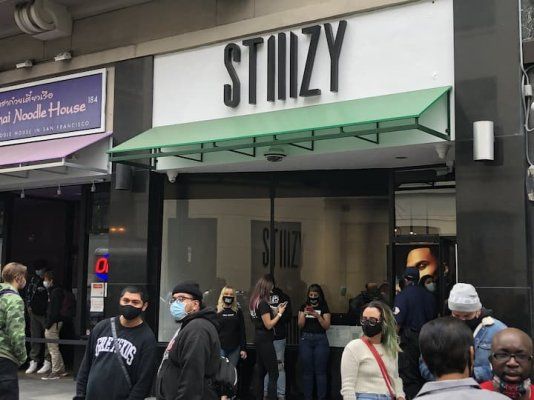The building was marked as Jerry's Liquor, but Compton code enforcement inspectors discovered a clandestine cannabis dispensary named Fly High 20 Collective inside in 2019. This was not an uncommon find in a city teeming with such illegal dispensaries. However, what was surprising was the owner of this property: Tony Huang, the brain behind Stiiizy, one of the largest and most successful cannabis companies in the industry.
Stiiizy was co-founded by Huang in 2017, following which he and his partners established a vertically integrated business that cultivates, distributes, and sells marijuana legally across California. Beyond being a simple company, Stiiizy positions itself as a “lifestyle brand,” offering clothing, organizing live events, and donating to social justice causes.
Nonetheless, in a lawsuit yet to be resolved, lawyers from Compton alleged that Huang, known for operating several illegal cannabis dispensaries, maintained control over the unlawful sale of marijuana from his property. Tony Huang's holding companies reportedly owned nine properties that have been identified by local, county, or state authorities as sites of illegal dispensaries. This information was gathered from a review of property, court, and tax records, along with interviews with law enforcement officials and dispensary employees.
Huang refused to be interviewed, but his spokesperson, Michael Sitrick, stated that Huang had purchased several investment properties which tenants had used, unbeknownst to Huang and in violation of the leases, as illegal dispensaries. When attempts to evict the tenants failed, Huang sold the properties.
Despite the legalization of retail cannabis sales in California in 2018, illicit dispensaries have thrived. These operations undermine the legal market by avoiding taxes and licensing fees. They disregard zoning restrictions and product testing requirements set up for public safety. Statewide, these cash-only businesses have become crime scenes, forcing authorities to invest substantial resources in attempts to shut them down, often with little success.
The only criminal prosecution linked to Huang concerning a dispensary ended with a probation sentence. He has resolved abatement cases by paying modest fines without admitting any guilt. No action has been taken against Huang's eight state licenses to grow and sell marijuana under the Stiiizy brand.
Huang, now 41, started his career as a cultivator, growing marijuana in his garage and selling to a medical dispensary. He opened a licensed dispensary in Santa Ana in 2014 but was also charged with several felonies. After serving a jail term and house arrest, Huang co-founded Stiiizy in 2017 with James Kim. The company's growth has been impressive, with 31 dispensaries across California and an anticipated earning of $46 million in 2020.
Despite the success, trouble has not been far away. While Huang's Pasadena license application was pending, Pasadena authorities were investigating an illegal dispensary at a building owned by Huang. The dispensary had opened in a former dress shop, and while trying to identify the property owner, city officials found a web of LLCs. The utilities were paid by another holding company, but the phone number listed on the bill connected to Tony Huang.
As investigations continue and allegations persist, the future of Huang's ventures remains uncertain. The case underscores the challenges faced by both authorities and legal cannabis businesses in dealing with the proliferation of illegal dispensaries.
Stiiizy was co-founded by Huang in 2017, following which he and his partners established a vertically integrated business that cultivates, distributes, and sells marijuana legally across California. Beyond being a simple company, Stiiizy positions itself as a “lifestyle brand,” offering clothing, organizing live events, and donating to social justice causes.
Nonetheless, in a lawsuit yet to be resolved, lawyers from Compton alleged that Huang, known for operating several illegal cannabis dispensaries, maintained control over the unlawful sale of marijuana from his property. Tony Huang's holding companies reportedly owned nine properties that have been identified by local, county, or state authorities as sites of illegal dispensaries. This information was gathered from a review of property, court, and tax records, along with interviews with law enforcement officials and dispensary employees.
Huang refused to be interviewed, but his spokesperson, Michael Sitrick, stated that Huang had purchased several investment properties which tenants had used, unbeknownst to Huang and in violation of the leases, as illegal dispensaries. When attempts to evict the tenants failed, Huang sold the properties.
Despite the legalization of retail cannabis sales in California in 2018, illicit dispensaries have thrived. These operations undermine the legal market by avoiding taxes and licensing fees. They disregard zoning restrictions and product testing requirements set up for public safety. Statewide, these cash-only businesses have become crime scenes, forcing authorities to invest substantial resources in attempts to shut them down, often with little success.
The only criminal prosecution linked to Huang concerning a dispensary ended with a probation sentence. He has resolved abatement cases by paying modest fines without admitting any guilt. No action has been taken against Huang's eight state licenses to grow and sell marijuana under the Stiiizy brand.
Huang, now 41, started his career as a cultivator, growing marijuana in his garage and selling to a medical dispensary. He opened a licensed dispensary in Santa Ana in 2014 but was also charged with several felonies. After serving a jail term and house arrest, Huang co-founded Stiiizy in 2017 with James Kim. The company's growth has been impressive, with 31 dispensaries across California and an anticipated earning of $46 million in 2020.
Despite the success, trouble has not been far away. While Huang's Pasadena license application was pending, Pasadena authorities were investigating an illegal dispensary at a building owned by Huang. The dispensary had opened in a former dress shop, and while trying to identify the property owner, city officials found a web of LLCs. The utilities were paid by another holding company, but the phone number listed on the bill connected to Tony Huang.
As investigations continue and allegations persist, the future of Huang's ventures remains uncertain. The case underscores the challenges faced by both authorities and legal cannabis businesses in dealing with the proliferation of illegal dispensaries.




